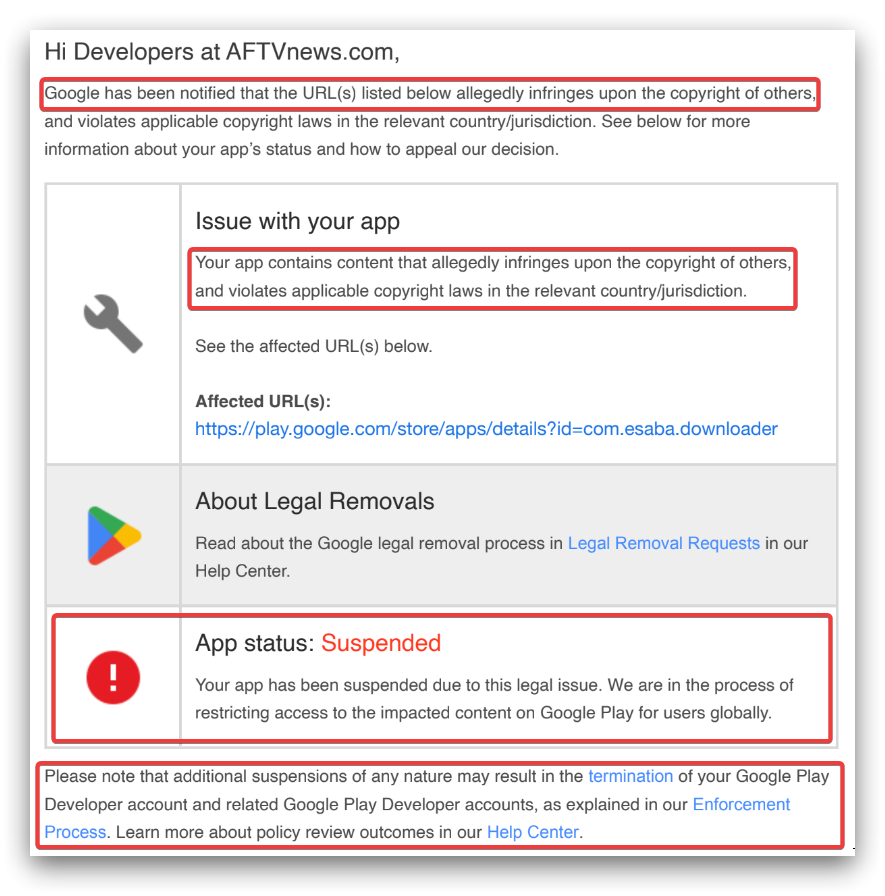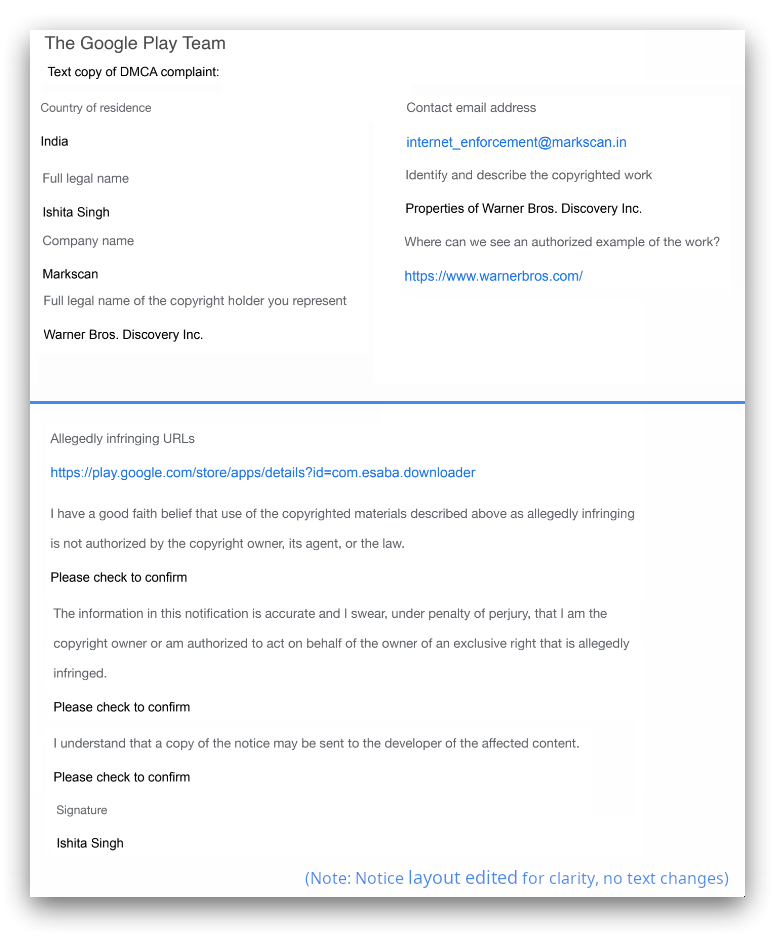 News that Sky had won a new High Court injunction to tackle pirate IPTV services first appeared in the
Financial Times
on July 30, 2023.
News that Sky had won a new High Court injunction to tackle pirate IPTV services first appeared in the
Financial Times
on July 30, 2023.
The article outlined an injunction similar to those previously obtained by the Premier League, noting that ISPs would be compelled to block Sky’s “best selling football games and blockbuster TV shows.” Why Sky would go to the trouble of obtaining an injunction to block access to matches, already being blocked by the Premier League, still makes little sense. Blocking TV shows was new, however.
Means to Shut Down Sites at Certain Times
The FT reported that the order obtained by Sky was designed to protect a “broader range of content” from across its programming.
“Sky will now have the means to shut down individual pirate sites at certain times,” the article noted, adding: “For example, the ruling could be used to block illegal access to The Ashes on Sky Sports Cricket, or to a specific show such as House of the Dragon on Sky Atlantic when it is first broadcast and reaches its largest audience.”
Apart from the apparent futility of blocking already blocked football matches, the report was entirely plausible and easily confirmed, had the actual High Court order been made available. Unfortunately, the UK’s system isn’t great and in the case of blocking injunctions, specific details are hidden to prevent circumvention. Even the names of the target IPTV providers can be difficult to determine, although not impossible.
Sky Causes Major Disruption
With almost no information accessible to the public and mystery surrounding Sky’s strategy, it’s impossible for outsiders to provide anything like a comprehensive overview. We certainly don’t claim to offer one here, but since all signs point to one of the most extraordinary mechanisms we’ve ever seen, taking a closer look seems warranted.
As
reported earlier
, BunnyStream, Enigma Streams, GenIPTV, CatIPTV, GoTVMix and IPTVMain are among the priority targets and from the information available to us, Sky’s blocking efforts have not gone unnoticed.
Providing exact dates is difficult and potentially unhelpful, but we estimate that over a period of four to six, maybe even eight weeks starting in August, Sky targeted between 80 and 100 domains/subdomains, most of them operated by the services listed above.
Subdomains were already in use on some platforms, but there are fairly clear signs that some targets deployed new subdomains as a countermeasure against blocking. At least for a while that can pay off, but we get the impression that Sky doesn’t wait long to respond either. In other cases, blocked domains seem to have been abandoned, suspended for abuse, or put up for sale.
Other countermeasures include the acquisition of new domains, backup domains being dusted off, and subscribers receiving advice to use a VPN to overcome blocking, as the text on one portal shows.
IPTV streaming is increasingly being targeted by cable operators and their lawyers. This has led to some IPTV services being blocked by ISPs. One popular example is the blockage of IPTV services regularly exhibited during Premier League matches in the UK.
Some IPTV services are able to circumvent this. However, the easiest and most reliable way to ensure you can still stream despite ISP blocks is to use a VPN.
Another 300 Blocks – But Blocking What?
With at least one of the targeted platforms resorting to what appear to be machine generated subdomains, Sky is certainly being kept busy, so at some point the High Court may be responsive to closing that loophole.
On top of what may have been the first batch of 90 domains/subdomains blocked previously, our estimates suggest another 250+ blocks since, and potentially more than 300. Whatever the true number, the volumes are high but as mentioned earlier, impossible for outsiders to properly measure.
That leaves the question of what Sky content these platforms are offering and how blocking that content dovetails with the order handed down in July. After obtaining a copy of the High Court order, the nature of the blocking is easily understood. Justice Meade’s key statements are as follows:
– The order sought has two elements, a dynamic block and a static block. Each of these, individually, is well precedented in decisions going back now over ten years in the case of the static blocking orders and, in many respects, the order sought today is a straightforward combination of those two types of orders.
– I do think it is appropriate to give some reasons in relation to the respects in which the orders sought today is different from what has come before. The significant difference, in my view, is that Sky seeks, in relation to the dynamic part of the order, to apply blocking measures at times and for periods of its choosing. The length of period and the amount of time that can be blocked per amount of calendar time is confidential (lest it facilitate evasion), and I will not state it in this judgment because I am sitting in open court.
– Under the proposed dynamic blocking approach, it would be Sky that chooses when to apply blocking measures, and for how long. The reason why this might be a potentially significant change is that it somewhat diminishes the amount of foresight that the court can use about the proportionality of the blocking. It might have, I was concerned, a slightly unpredictable effect or at least the capacity for an unpredictable effect. Without, as I say, going through the details of the periods permitted because they are confidential, I would be concerned about the effect that the new approach might have on the ISPs.
– That concern in relation to the ISPs is, of course, very substantially ameliorated by the fact that they have not opposed this order and have been in dialogue with Sky and its experts about what is proposed. On the evidence I have seen, I am satisfied that they are not unduly concerned.
These details pertaining to the blocking aspects of the injunction are certainly interesting. Unfortunately, the nature of the content that effectively authorizes blocking under the terms of the injunction is even less clear now than it was in the summer.
Not Particularly Valuable, “Relatively Banal” Content
Blocking injunctions have nearly always been sought to protect specific, high-value content. Hollywood obtains injunctions to protect movies and the recording industry aims to protect music, it’s usually as simple as that. The overall goal of the Sky injunction is no different in that respect.
However, it appears that unlicensed distribution of Sky’s most popular football matches, House of the Dragon, or other high-value content, isn’t the specific trigger for blocking under the terms of the injunction. Indeed, Justice Meade’s comments made at various points in the order indicate that the opposite is true.
– This is quite a significant departure from previous orders which have been more specifically targeted at, particularly, valuable content in the nature of a particular sporting events and the like.
– I do think the proportionality analysis is different and merits comment because the blocking is not, in this instance, targeted at particularly valuable or notable content.
– [T]he fact that the blocking windows permitted are not around the clock and are to be targeted by Sky at its own election, and the fact that that will, in principle, allow Sky to deploy blocking windows against content which might, theoretically, at least be relatively banal…
– Although the blocking is not necessarily to be directed to premium content, the goal of doing it is to protect that content and to protect the totality of Sky’s investment in its broadcast business as a whole.
Such an unorthodox yet innovative blocking injunction could be a sign that a specific issue presented unique challenges. We have no clear information to show that was actually the case, but coming up with a hypothetical scenario that fits isn’t too difficult.
Hypothetical Problem, Hypothetical Solution
Under EU law, sporting events are not classifiable as works under the Copyright Directive. Football matches, for example, are subject to the rules governing the game, which leaves no room for creative freedom. As a result, live football matches are not protected by copyright law.
However, if a live match is recorded before its onward transmission, augmented by unique copyrighted elements such as logos, graphics, incidental music, and other intellectual property already owned by a broadcaster, a match becomes a film protected under copyright law.
That might lead to a theoretical injunction application requesting site-blocking to protect ancillary content, but has the ultimate goal of protecting all content, in and around it, while potentially avoiding time-consuming licensing intricacies.
After all, site-blocking is a blunt instrument, so if a smash-hit TV show just happened to air seconds after a copyrighted advert, potentially containing copyrighted music theoretically owned by a broadcaster, blocking wouldn’t discriminate.
Useful collateral damage then? Possibly, at least in theory.
From:
TF
, for the latest news on copyright battles, piracy and more.
chevron_right
 Created by software developer Elias Saba and released on the Amazon Appstore in November 2016, ‘Downloader’ offered two things; an empty URL field and a download button.
Created by software developer Elias Saba and released on the Amazon Appstore in November 2016, ‘Downloader’ offered two things; an empty URL field and a download button.




 Signed into law a quarter century ago, the Digital Millenium Copyright Act (DMCA) aimed to equip copyright holders with new tools to protect their works online.
Signed into law a quarter century ago, the Digital Millenium Copyright Act (DMCA) aimed to equip copyright holders with new tools to protect their works online.




 Ulož.to is one of the most popular sites in the Czech Republic, built on a reputation of allowing users to share files with each other and those further afield. In common with other sites operating in that field, Ulož has found the road ahead becoming increasingly complicated.
Ulož.to is one of the most popular sites in the Czech Republic, built on a reputation of allowing users to share files with each other and those further afield. In common with other sites operating in that field, Ulož has found the road ahead becoming increasingly complicated.






 Under U.S. copyright law, Internet providers must terminate the accounts of repeat infringers “in appropriate circumstances.”
Under U.S. copyright law, Internet providers must terminate the accounts of repeat infringers “in appropriate circumstances.”


 In 2021, the US Department of Justice launched a
In 2021, the US Department of Justice launched a




